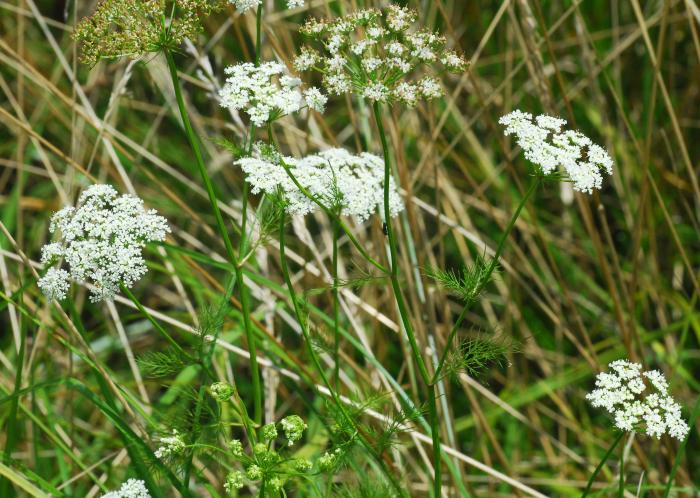Ptilimnium costatum Raf.
Big Mock Bishop's Weed

Native
CC = 7
CW = -5
MOC = 17
© SRTurner
Ptilimnium costatum Raf.Big Mock Bishop's Weed | |
 |
Native CC = 7 CW = -5 MOC = 17 |
© SRTurner |
|
Family - Apiaceae Habit - Annual forb. Stem - Erect or ascending, to 1.5 m, glabrous.
Leaves - Alternate, petiolate with sheathing bases. Blades to 15 cm long, 2-3x pinnately dissected, with main segments mostly in whorls of 3-5 along the rachis, the ultimate divisions 3-18 mm long, threadlike.
Inflorescence - Compound umbels. Involucre of 4-15 bracts, these 5-12 mm long, narrowly linear, mostly entire. Rays 12-25, 1.5-4.5 cm long. Involucel of 2-5 bractlets, these shorter than the flower stalks, linear.
Flowers - Florets 15 to numerous in each umbellet, on stalks 2-6 mm long. Sepals minute triangular scales. Petals obovate, often notched at tips, white.
Fruits - 2-4 mm long, glabrous, with relatively narrow, inconspicuous, dark brown surfaces between the lateral ribs and the commissures, and also between the ribs, the oil tubes inconspicuous.
Flowering - July - September. Habitat - Swamps, sloughs, streambanks, acid seeps, ditches. Origin - Native to the U.S. Lookalikes - Several other members of the Apiaceae, e.g. those in the genera Angelica, Torilis, Ligusticum, and several others. Other info. - At a sideways glance this plant may resemble Queen Anne's Lace; however, the leaves are totally different. The plant is relatively uncommon. In Missouri it is largely restricted to the Bootheel region. It is also found in several southeastern states, but nowhere is it common. The photos above represent a somewhat disjunct population, occurring in a wet powerline cut in Franklin County. Photographs taken at Robertsville State Park, Franklin County, MO, 8-1-2015 (SRTurner). |